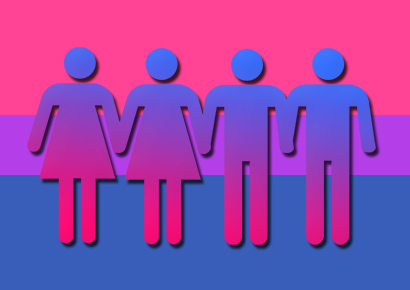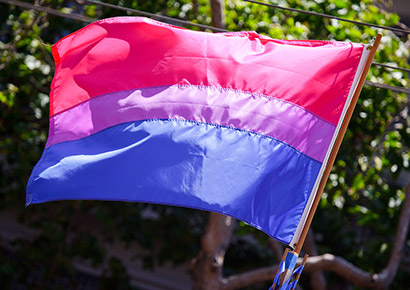It’s Bisexual Awareness Week | Celebrating our bi community
 The bisexual community is often the most forgotten element of the LGBTQ acronym. That’s why it’s time to remember and support our bi+ brothers and sisters.
The bisexual community is often the most forgotten element of the LGBTQ acronym. That’s why it’s time to remember and support our bi+ brothers and sisters.
Now in its fourth year, BiWeek (Bisexual+ Awareness Week) runs from Sunday, 17 September till Sunday, 24 September, while Bisexuality+ Day is celebrated on 23 September. Created in the US by GLAAD and BiNet USA, the campaign has begun spreading around the world.
The aim of BiWeek is to draw attention to the bisexual community’s experiences and challenges, including their ongoing invisibility and erasure. The theme this year is “Past, Present, and Future,” and seeks to highlight the community’s contributions historically and in the present day.
The week also serves to refute widespread myths about bisexuality. Importantly, we need to affirm that being bi is a legitimate sexual identity. It doesn’t mean that you are confused, simply refusing to come out as gay or lesbian, or that you have to necessarily sleep with or have relationships with both men and women at the same time.
Activist Robyn Ochs describes being bisexual like this: “I call myself bisexual because I acknowledge that I have in myself the potential to be attracted – romantically and/or sexually – to people of more than one sex and/or gender, not necessarily at the same time, not necessarily in the same way, and not necessarily to the same degree.”
In South Africa, according to a recent study by the Love Not Hate campaign, between 10 and 12 percent of the LGBT community identify as bisexual. Numerous overseas studies, however, suggest that bisexual people may actually be the largest subset of the LGBT community. And, more and more young people around the world are refusing to identify themselves as strictly heterosexual, choosing a more sexually fluid path.
One South African who’s stood up to be counted as proudly bisexual is Werner Pieterse from Gauteng, the founder of amBi South Africa. He first came out to his wife as bisexual four years ago.
There are millions of bi people who are closeted, isolated and stigmatised
“Today, at the ripe old age of 33 and two months, I am out almost entirely,” Pieterse told Mambaonline. “My wife and I started coming out to close friends and family in October 2016 and in July 2017 we took the trip down to the Western Cape to tell my parents and her parents that I am bisexual.”
“The liberation, freedom, self-acceptance and identity development associated with coming out is not just profound, it is necessary and it speaks to the core of our beings,” he said.
Before coming out, Pieterse felt isolated and afraid. “I did not know any other bi people at that time. When I tried to reach out to people in South Africa, I could not find any support for bi people anywhere in the country. Which led me to North America.”
There, he found support groups for the bi community and started interacting with “people like me” for the first time in his life. “I can’t stress the importance of having a sense of community and a safe space to be yourself with other people like you,” he explained.
Pieterse is now launching the official Gauteng-based amBi South Africa chapter on 23 September, as part of the global amBi network. amBi exists to build a bi community through events and activities that allow bi people to meet, establish meaningful friendships, and have fun.

The bisexual pride flag was created by Michael Page in 1998
“What started off as a support group for mostly men in May 2017, is rapidly expanding into a social and support group that opens its doors for bi+ people from all demographics,” said Pieterse.
If you’re interested in expanding your sense of bisexuality, getting to know good people, and taking part in interesting and fulfilling events – all while hanging out with fellow bis – then this group could be for you. To join amBi South Africa, sign up for their Meetup group here.
“There are many millions of people that are bi, closeted, stigmatised and isolated and most of them probably still feel alone. That is why we need bi awareness,” said Pieterse.
So this week especially, make the effort to reach out and embrace our bisexual brothers and sisters as a vital, vibrant and valuable part of our diverse LGBTQ community.
- Facebook Messenger
- Total201
Leave a Reply